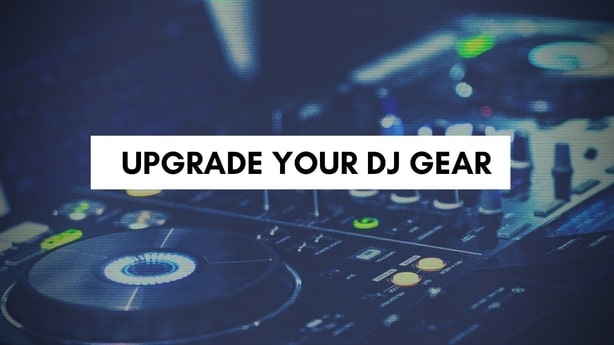
Growing up I always wanted to have the next best DJ equipment that was released onto the market. This is what’s known as “shiny object syndrome”.
Little did I know that it’s not just about the DJ equipment, it’s more about the DJ skills that you have to mix together amazing DJ sets. Even today I still keep my eye out for the latest and greatest DJ controller or DVS mixer. So I thought I share with you my top 10 tips on upgrading your DJ gear (without having “shiny object syndrome”, and thinking more practically). Here goes.
Budget
The step between price points between budget and professional DJ equipment 10, 20 years ago was pretty big. For example my Direct Drive turntables and mixer setup were around £450. If I went to a “club industry” brand, total price is looking more like £1,000 to £1,500 easily.
Nowadays the price points between DJ equipment, and I mean DJ Controllers in this instance, is much smaller. Meaning that the step up from an ultra budget beginner DJ Controller to a decent DJ controller could be from around £89 ($120) to £250 ($340).
So the point here is, if you have the money, then why not upgrade, particularly if you love DJing and want to get better at using certain features such as DJ effects, have greater functionality etc. It may be the case that you invest that bit more money and your DJ equipment lasts you a great deal longer.
2 Channel vs 4 Channels on Your Mixer
Some types of genres require DJs to mix more than just two tracks together. Mixing vocal acapellas or dropping in a track temporarily can be the extra creativeness that some DJs require, which you’re super limited to with a 2-Channel mixer. Thus the debate of 2-channels vs 4-channels.
Whether it be a DJ controller or DJ mixer, upgrading to a 4-Channel can give your much greater flexibility in mixing music quicker and more creatively.
This might not be a point that you’ve considered before but could be a very valid point in your decision making process when upgrading. Do remember though, if you already have a decent DJ controller for example upgrading from a 2 to 4-channel mixer is a marginal gain, so always consider the cost vs benefit ratio here.
Advances in Technology (DVS Mixers and Phase)
One of the things that’s caught my eye is the fact you can now buy a DJ mixer with DVS compatibility built in. No more external audio interfaces with a load of phono cables to sort out plugging into the DJ mixer. Setting up in a club was slightly intense plugging everything in when taking over from the next DJ.
Therefore the main benefit from a DJ mixer with built-in DVS compatibility is more space around your DJ setup and DJ booth, plus more ease of setting up your DJ equipment when playing live.
Oh, and don’t forget Phase, the digital needle, also a DVS compatible focused DJ setup. No more jumping needles from record vinyls being scratched / damaged or movement on the DJ booth table. Well worth a look if you haven’t seen Phase before.
The benefits of new technology can massively outweigh the impracticalness of older DJ technology and equipment, so it’s worth understanding what benefits can be brought to your DJing and setup.
Goals as a DJ (Industry Standard)
Your personal DJing goals will more than likely dictate which direction you should go with your DJ equipment upgrades.
If you’re a hobby DJ then you don’t always need to worry about the latest and greatest / most expensive DJ equipment.
However if your aim is to become a professional DJ who’s ambition is to exchange your DJing skills and services for money in the long term, then upgrading could be on the cards for you.
The cliche “industry standard” has always been a term that has bounced around the DJ scene since I first started DJing at the the age of around 15. But there is an element of truth to this. If there’s a brand that dominates their presence in the majority of clubs in and around the world, then you’ll need to become familiar with this DJ equipment, to an extent of course.
A few points to consider include:
- Pioneer DJ equipment is pretty good at offering very similar design, functions and features throughout it’s range. Budget through to advanced. Which can help if the clubs you’re DJing in have Pioneer DJ equipment.
- You don’t always need to upgrade. DJing at a radio station, local DJ studio or a friends house might give you the experience and confidence to not worry about upgrading just yet.
- You might not be DJing in a club, so you could consider hauling your own DJ equipment to a gig, for example if you’re a mobile DJ or wedding DJ. No needs to worry about industry standard DJ gear here.
Compatibility of Equipment (Ports)
I love DJ controllers, I really feel that they’ve helped many new DJs and older vinyl DJs to revive their passion for DJing.
However, some of the budget / low end price point DJ controllers have limited ports and connectivity which can sometimes be frustrating.
So again if you’re looking to plug-in different or multiple speakers, record your DJ sets to an external device or plug-in a USB stick for accessing your DJ music then ‘upgrading’ your DJ controller might be a good idea.
Tip: buying second hand DJ controllers (or equipment in general) might be a good idea. My predictions for the future are that there are so many variations of DJ controllers that you can buy, it might lead to a lot of DJs upgrading.
Therefore opening up a greater amount of second-hand used DJ controllers on the market. So if you want to upgrade on a budget, this is one to consider. Always test out the DJ equipment before you purchase though.
Laptop or No Laptop
This is probably quite a niche consideration but I’m sure some of you DJs out there might be on the same page as me though.
Currently I’m DJing a lot in my ‘music man cave’ with a Pioneer DDJ-400. The setup of this requires plugging into a laptop with DJ software operating on the laptop (Rekordbox).
When DJing out and about, e.g. parties or bars etc, I will use my All-In-One DJ Controller. This gives me the flexibility to take less equipment, no laptop, just simply a controller and plug-in USB sticks. Obviously speakers etc are required, but my point is no laptop.
As a music producer I want to limit damaging my laptop, and I feel taking the laptop out to gigs is super risky and pointless doing so.
Hopefully this point makes sense and help you out upgrading your DJ controller or equipment in the future.
Quality of Audio from Speakers
Having shitty speakers will only put you at risk of not being able to DJ as well as in the clubs or bars. This is because high end speakers will more often than not have a crisper sound compared to yours.
Just consider this if you want to become a professional club DJ playing live. High quality DJ speakers in your studio setup will help your DJing ear feel more comfortable when transitioning over to a live club setting.
Protect your Hearing with Better Headphones
Ear fatigue is massive when it comes to DJ headphones. I’ve experienced this first hand in the early days, and luckily for me so far I’ve not had massive issues with tinnitus. I definitely feel for you DJs out there that do have tinnitus.
Not so long ago I bought a range of DJ headphones from super low budget up to high-end headphones.
All I can say is that there’s a strong correlation between quality and higher price. The higher the price you pay, the better quality (and comfort).
My suggestions are V-Moda M-100s or HD25s from Sennheiser.
Check out my headphone reviews and recommendations here.
Belt Drive Turntables vs Direct Drive
If you’re new to DJing and really want to focus on vinyl only DJing, then my advice is to buy Direct Drive DJ turntables, belt drive suck! Big Time!
That is all.
Recording your DJ Sets
External recording devices can really help have a back up copy of your DJ mix, improve the audio quality of your DJ mixes and capture extra “audience noise” of your live performances.
Recording your DJ sets from the DJ software I’ve found is really great for audio quality and ease of use. Although sometimes I do find it can be better in certain instances to use an external recording device such as the Zoom H4N.
Upgrading or simply investing in an external recording device could really take the pressure off trying to do too many things on a laptop or DJ controller.
If you want to find out more about how to record your DJ sets, click here.
Tip: Always press record. I’ve played amazing DJ sets before where I’ve forgot to press record, very infuriating. Sharing your DJ mixes with the world is very important, so ALWAYS PRESS RECORD.
Final Thoughts
Don’t upgrade if you really don’t need to. A tip from me is to find a local (or the nearest) DJ studio, local community centre or friend that has DJ equipment that is “more” advanced than your current setup. This will allow you to indulge in this new DJ equipment and get some experience DJing with it all. Then make your decision from there if you actually ‘need’ new equipment, vs ‘want’.
